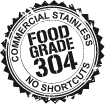
Is Stainless Steel The Perfect Material For Commercial Kitchens?
Why Use Stainless Steel in Your Kitchen?
Stainless steel is one of the most common materials found in kitchens today. It’s used in everything from appliances to cookware, dishware, flatware and utensils because it is durable, easy to sanitize and corrosion resistant to various acids found in meats, milk, fruits and vegetables.
At Brayco, we understand that commercial kitchens are the busiest places in the hospitality industry. The rush goes on from morning to night without any respite. This calls for increased efficiency and an utmost hygienic atmosphere with extremely durable equipment.
Stainless steels’ impermeable surface prevents the absorption of moisture and the resulting decay. Most importantly though, stainless steel is a safe option when it comes to use with food and beverage, as there are no chemicals that can migrate into your food from these products.
The major stainless-steel components of a commercial kitchen are food-grade work benches, sinks, shelving, cabinets as well as cool and dry storage.
Brayco Stainless Steel Products
- Stainless Steel Benches
- Stainless Steel Cabinets
- Stainless Steel Sinks, 1,2 & 3 bowl
- Stainless Steel Wall Mounted Sinks
- Stainless Steel Taps
- Stainless Knee Operated Sinks
- Stainless Steel Wall Shelves
- Stainless Steel Dishwasher Compatible Sinks and Benches
- Stainless Steel Trolleys
- Stainless Steel 4 Tier Shelf Units
Stainless Steel: Composition and Types
Stainless-steel is the name given to the category of several iron-based alloys that have at least 10.5% of chromium. It is an amalgamation of iron and different metals in different ratios.
304 Stainless Steel
This is the most popular stainless steel type used in industrial applications. It contains 65% iron, and its major components are 18% chromium and 8% nickel.
It is high in demand for its non-magnetic quality. This alloy features a lower conductivity of heat and electricity as compared to carbon steel and regular steel. It can withstand the corrosive impacts of chlorides and other minerals found in water. These attributes make the 304 stainless steel stress corrosion-resistant and thereby crack proof.
These steels also exhibit excellent resistance to a wide range of atmospheric, chemical and food industry exposures. Typical uses include architectural mouldings and trim, surgical equipment, kitchen equipment and food processing.
Most of our Brayco Products are made with ultra durable, rust resistant and easy to clean 304 Stainless steel.
Use of 1.2mm thick 304 steel on benches ensures strength and durabilty.
430 Stainless Steel
This alloy has a greater quantity of iron and negligable nickel. It is made of 80% iron, 16-18% chromium and 3% constitutes the other non-iron metals. Due to its high iron content, it falls under the ferritic category of steels – magnetic. It is resistant to corrosion, does not react to nitric acid. These crucial properties make the 430 steel more suited to automotive trim and molding, furnace combustion chambers, dishwashers, range hoods, gas burners on heating units, gutters and downspouts.
430 Contains a negligible amount of nickel and therefore has a reduced corrosion resistance (is more likely to rust than 304 but still high quality). It does not provide the resistance to pitting by dilute reducing acids that is provided by the 304 grade steel.
NB: Nickel enhances the corrosion resistance of stainless steel. Therefore, the higher the nickel content, the more resistant the stainless steel is to corrosion.
Frequently Asked Stainless Steel Questions
Are all stainless steel food grade?
The most common of all stainless steel grades. 304 is used in kitchens throughout the world.
Other grades are more suitable for marine applications, cutlery and food storage containers.
There are many different kinds of food grade stainless steel options available for your kitchen. Whether you need food grade containers or food grade pots and pans, please make sure you check the quality of the steel before you buy.
Difference between 304 and 430
The “grade” of stainless steel refers to its quality, durability and temperature resistance. The main difference is the composition of the stainless steel and the amount of chromium and nickel in the product
304 grade stainless steel contains a considerable amount of nickel unlike the 430 grade which makes 304 more corrosion resistant and particularly suitable for harsh environments.
304 is non-magnetic stainless steel whereas 430 have high magnetic properties. Though generally very weldable, some ferritic steel grades can be prone to sensitization of the weld heat-affected zone and weld metal hot cracking.
The presence of nickel makes 304 more corrosion resistant; it also makes it much easier to press and draw. The absence of nickel in 430 grade means the stainless steel will most likely crack or fail completely compared to pressing 304.
Crevice Corrosion. Periodic disassembly and cleaning out of all areas where crevice corrosion may occur is recommended on 430 grade steel. When narrow crevices and other “nooks and crannies” on stainless steel kitchen equipment get filled with solutions that cannot easily exit, protective films can break down and corrosion set in. As evaporation and refilling alternately recur, the trapped solution gets stronger and stronger, speeding up the corrosion process. Gaskets, washers, sharp corners, overlaps, and flanges are frequent “targets” of crevice corrosion.
304 is more expensive, while 430 is considerably cheaper.
Is stainless steel rust-free?
No stainless steel product is completely rust-free if exposed to non-suitable conditions. However, the 304 stainless used in Brayco products is almost-completely resistant to rust if maintained correctly. Visit the best stainless steel benches for more info.
Why use stainless steel
In addition to resistance to weathering and therefore the inability to rust, the material also features extremely important technical characteristics which make it particularly suitable for use in the professional kitchens of great Chefs. Indeed, it proves to be:
- Long-lasting
- Biologically pure
- 100% recyclable
- Easy to clean
Stainless steel is the ideal material for hygiene in domestic and commercial kitchen settings, because it is easy to clean and biologically neutral, in addition to being an eco-friendly product that is 100% recyclable. An eternal material, one that is charming and functional that ages slowly without losing any of its characteristics.
Why choose Brayco Stainless Steel?
Brayco has made the most of the know-how of skilled stainless steel craftsmen and our 15 years industry experience to offer a comprehensive range of professional-grade, fully modular kitchen benches, sinks such as wall mounted mop sink, cabinets and shelving.
Our clients have been loving our stainless steel products for over 15 years. Why not visit us in one of our 7 locations across Australia and get a hand from our friendly staff?




